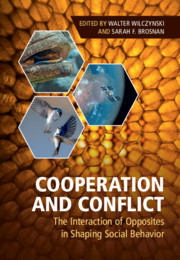Book contents
- Cooperation and Conflict
- Cooperation and Conflict
- Copyright page
- Dedication
- Contents
- Contributors
- Acknowledgments
- Introduction
- Part I Broad Insights from Political Science to Molecular Behavior
- 1 Cooperation and Conflict in International Relations
- 2 Internalizing Cooperative Norms in Group-Structured Populations
- 3 Reputation
- 4 Finding the Right Balance
- Part II Neural Mechanisms
- Part III Species Comparisons
- Index
- References
1 - Cooperation and Conflict in International Relations
from Part I - Broad Insights from Political Science to Molecular Behavior
Published online by Cambridge University Press: 08 February 2021
- Cooperation and Conflict
- Cooperation and Conflict
- Copyright page
- Dedication
- Contents
- Contributors
- Acknowledgments
- Introduction
- Part I Broad Insights from Political Science to Molecular Behavior
- 1 Cooperation and Conflict in International Relations
- 2 Internalizing Cooperative Norms in Group-Structured Populations
- 3 Reputation
- 4 Finding the Right Balance
- Part II Neural Mechanisms
- Part III Species Comparisons
- Index
- References
Summary
The most fundamental questions in international relations are: “Why do states go to war?” “How can interstate conflict be prevented or ameliorated?,” and “What are the pathways to greater international cooperation?” In considering these questions, the dominant paradigm in international relations, political realism, emphasizes the enduring propensity for conflict among self-interested states seeking their security in an “anarchic” international environment, that is, one where there is no central authority to protect states from each other or to guarantee their security. Hence, international cooperation is thought to be rare, fleeting, and tenuous – limited by enforcement problems and each state’s preference for larger relative gains in any potential bargain because of its systemic vulnerability (Morgenthau, 1949; Waltz, 1979). At the extreme, states find themselves in a security condition of mutual distrust that resembles a prisoner’s dilemma game. (See Box 3.1 in Chapter 3 for a description of various games.) Maintaining an equilibrium in the international system through a balance of power and limited cooperation are all that can be hoped for; a situation where war, large-scale violent conflict, is natural and merely “diplomacy by other means” (von Clausewitz, 1989). This is not to argue that international relations are in a constant state of war, rather that they exist within the shadow of war as a final arbiter.
- Type
- Chapter
- Information
- Cooperation and ConflictThe Interaction of Opposites in Shaping Social Behavior, pp. 7 - 25Publisher: Cambridge University PressPrint publication year: 2021



